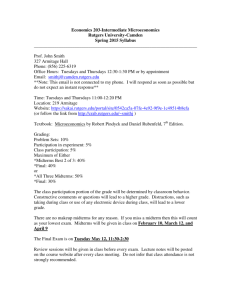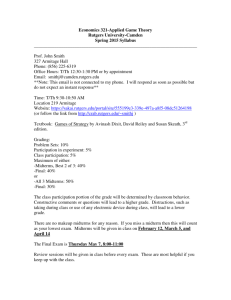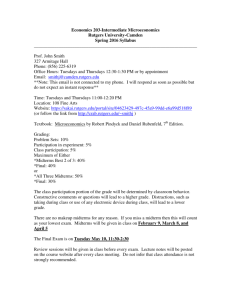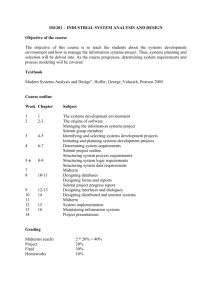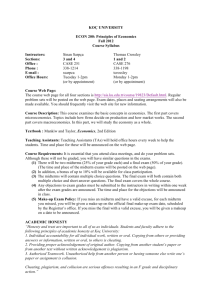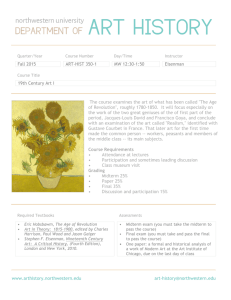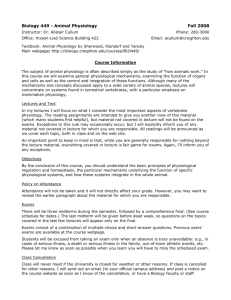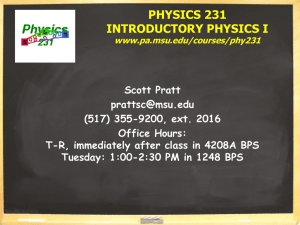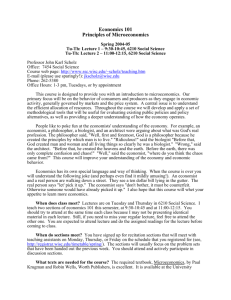Econ 333 - Rutgers University
advertisement
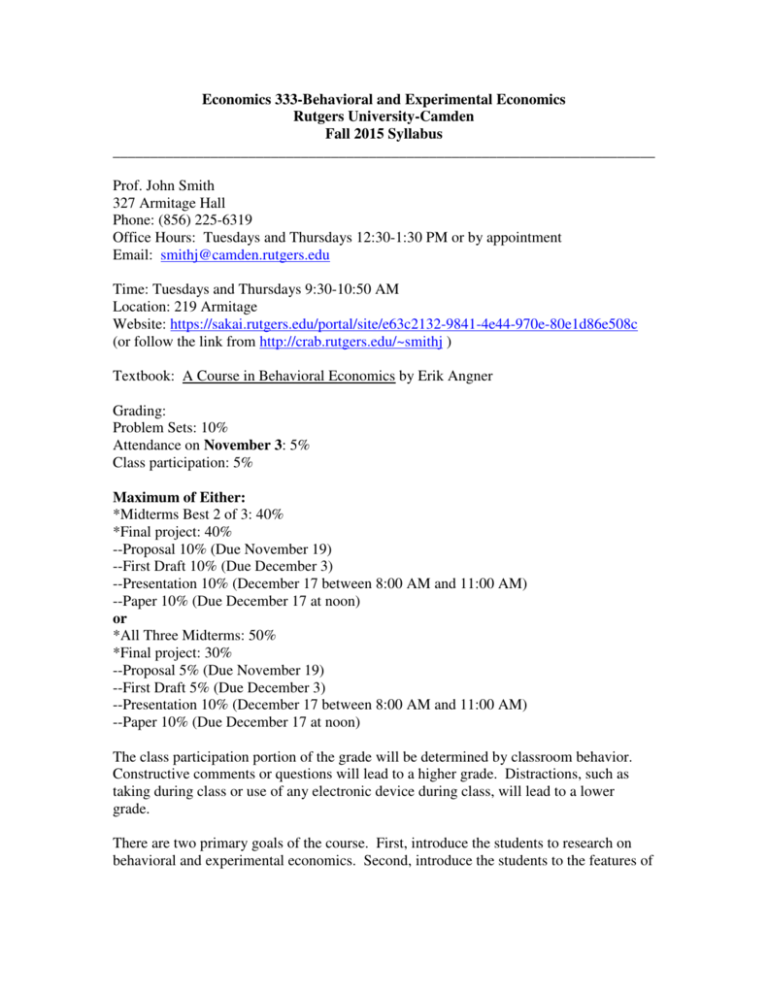
Economics 333-Behavioral and Experimental Economics Rutgers University-Camden Fall 2015 Syllabus ________________________________________________________________________ Prof. John Smith 327 Armitage Hall Phone: (856) 225-6319 Office Hours: Tuesdays and Thursdays 12:30-1:30 PM or by appointment Email: smithj@camden.rutgers.edu Time: Tuesdays and Thursdays 9:30-10:50 AM Location: 219 Armitage Website: https://sakai.rutgers.edu/portal/site/e63c2132-9841-4e44-970e-80e1d86e508c (or follow the link from http://crab.rutgers.edu/~smithj ) Textbook: A Course in Behavioral Economics by Erik Angner Grading: Problem Sets: 10% Attendance on November 3: 5% Class participation: 5% Maximum of Either: *Midterms Best 2 of 3: 40% *Final project: 40% --Proposal 10% (Due November 19) --First Draft 10% (Due December 3) --Presentation 10% (December 17 between 8:00 AM and 11:00 AM) --Paper 10% (Due December 17 at noon) or *All Three Midterms: 50% *Final project: 30% --Proposal 5% (Due November 19) --First Draft 5% (Due December 3) --Presentation 10% (December 17 between 8:00 AM and 11:00 AM) --Paper 10% (Due December 17 at noon) The class participation portion of the grade will be determined by classroom behavior. Constructive comments or questions will lead to a higher grade. Distractions, such as taking during class or use of any electronic device during class, will lead to a lower grade. There are two primary goals of the course. First, introduce the students to research on behavioral and experimental economics. Second, introduce the students to the features of the experimental methodology, so that the student can subsequently apply it in other contexts. There are no makeup midterms for any reason. If you miss a midterm then this will count as your lowest exam. Midterms will be given in class on September 29, October 29 and December 10. A project is given in lieu of a final exam. The project will be graded based on the proposal, the first draft, the final draft, and a presentation. Review sessions will be given in class before every exam. Lecture notes will be posted on the course website after every class meeting. Do not infer that class attendance is not strongly recommended. Attendance on November 3 will account for 5% of your grade. During a portion of that class, you will participate in an experiment. You must be on-time in order to obtain the credit. It is assumed that you have taken Principles of Microeconomics. I only accept email attachments in pdf format. Discussion of Project Every student must complete a final project. The topic of the project will take the form of a proposal for an experiment. Although the execution of an experiment faces many constraints (subjects, money, etc.), the project can be written as if they experimenter does not face such constraints. A good project will 1. Precisely specify an experiment 2. State why the results of the experiment are interesting, and 3. State what is known about the topic The timing of the project is as follows: On November 19 must submit a proposal of a half a page of text. This will be returned with written feedback. On December 3 must submit a first draft of no less than 2 pages of text, not including the list of references, graphs, tables, and experimental instructions. This will be returned with written feedback. On December 17, between 8:00 AM and 11:00 AM must give a presentation of paper. By December 17 at noon must submit a final draft of the paper of no less than 2 pages of text, not including the list of references, graphs, tables, and experimental instructions. All written material associated with the project must be typed. The grade of each portion of the project will be based on 1. Creativity 2. Effectiveness 3. Demonstration of the material discussed in the course In addition to the course textbook, the students are encouraged to search for inspiration elsewhere. Predictably Irrational by Dan Ariely is a good place to start. Schedule September 1-Lecture 1 Chapter 1-Introduction September 3-Lecture 2 Chapter 2-Rational Choice under Certainty September 8-No class, Monday schedule September 10-Lecture 3 Chapter 2-Rational Choice under Certainty September 15, 17, and 22-Lectures 4, 5 and 6 Chapter 3-Decision-Making under Certainty September 24-First Midterm Review September 29-First Midterm October 1-Lecture 7 Sections 4.1 through 4.3-Introduction, Fundamentals of probability theory, Unconditional probability October 6-Lecture 8 Sections 5.1 through 5.3-Introduction, The gambler’s fallacy, Conjunction and disjunction fallacies October 8-Lecture 9 Section 4.4-Conditional probability October 13-Lecture 10 Section 4.5-Total probability and Bayes’ rule October 15-Lecture 11 Section 5.4-Base-rate neglect October 20-Lecture 12 Sections 4.6 and 4.7-Bayesian updating, Discussion October 22-Lecture 13 Sections 5.5 through 5.7-Confirmation bias, Availability, Discussion October 27-Second Midterm Review October 29-Second Midterm November 3-Lecture 14 Experiment Day November 5 and 10-Lectures 15 and 16 Chapter 6-Rational Choice under Risk and Uncertainty November 12, 17, and 19-Lectures 17, 18, and 19 Chapter 7-Decision-Making under Risk and Uncertainty Proposal Due on November 19 November 24-Lecture 20 Chapter 8-Discounted Utility Model November 26-Thanksgiving, No Class December 1-Lecture 21 Chapter 9-Intertemporal choice December 3-Lecture 22 Chapter 9-Intertemporal choice First Draft Due December 8-Third Midterm Review December 10- Third Midterm Final Exam Period for the course is Thursday December 17, 8:00 AM-11:00 AM Presentations will occur during this time and papers are due at noon
